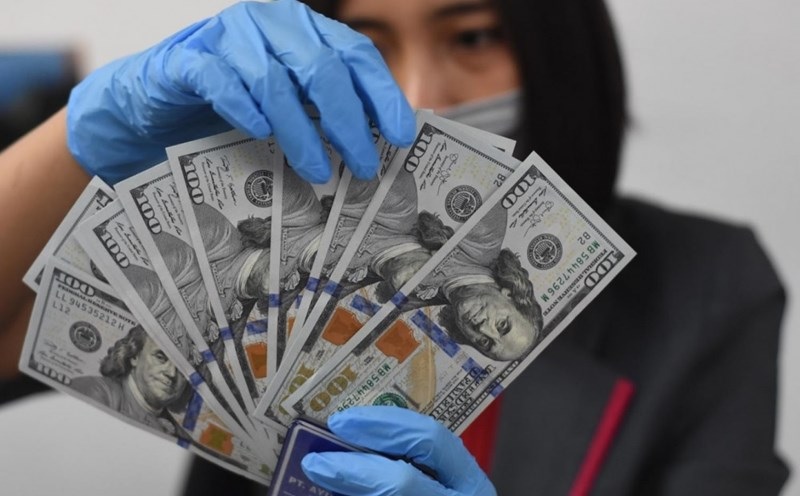How to boost exports to the US without being labeled a currency manipulator?
Increasing exports to the United States is critical for growing Vietnam's international commerce. However, in order to avoid being placed on the US currency manipulation blacklist, we must implement suitable exchange rate rules.
The US Treasury has placed six economies on its watch list, including China, Germany, Malaysia, Singapore, Taiwan, and Vietnam. Vietnam achieved two thresholds: a bilateral goods and services trade surplus with the United States (at $105 billion, over the $15 billion criterion) and a current account surplus equal to 4.7% of GDP (exceeding the 3% GDP threshold). To shed light on this matter, a Business Forum reporter spoke with Mr. Nguyen Tri Hieu, a financial and banking specialist.

- How do you view the United States' latest decision to place Vietnam on its watch list, sir?
To begin, we must understand that the United States evaluates potential currency manipulation by its major trading partners using three criteria: a bilateral goods trade surplus with the United States of not more than $15 billion, a current account surplus of not more than 3% of GDP, and criteria based on the central bank's net purchases of foreign currency over a 12-month period.
Vietnam was placed on the watch list after exceeding the thresholds for two categories, according to the report "U.S. Macroeconomic and Foreign Exchange Policies of Major Trading Partners of the United States" produced by the US Department of Treasury. As a result, Vietnam has not been identified as a currency manipulator.
The United States thinks that nations who take advantage of the trading situation between the United States and them, as indicated by trade balances, current account surpluses, and net purchases of foreign currency to inflate exchange rates, should be warned and then penalized. The United States use these variables in a highly technical manner; if a nation fits all three requirements, it will be designated as a currency manipulator, regardless of its diplomatic relations with the United States.
Taiwan and Switzerland were also included on this list last year. Vietnam has been on and off the watchlist multiple times, which is quite alarming. The State Bank of Vietnam will often attempt to stabilize the currency rate in order to reduce trade disputes between the two nations.
Vietnam and the United States have elevated their ties to a comprehensive strategic partnership. Despite this encouraging improvement, the United States' continued inclusion of Vietnam on the surveillance list demonstrates their simple attitude. We shouldn't be excessively concerned, but we also can't disregard such signs. If these requirements continue to grow within 6 months to a year and Vietnam is added to the list of currency manipulators, the US may take punitive steps.
- Could you please tell us how this situation would impact Vietnam's economy?
First, the United States will raise import duties on Vietnamese goods, which will have a direct impact on our exports and the whole economy, as the United States is Vietnam's largest export market. This has an influence not just on international commerce but also on GDP growth, which is confronting several obstacles. In actuality, this is a purely business problem that will have few political or diplomatic ramifications.
Second, policymakers, especially the State Bank of Vietnam, will need to balance and calculate in order to accommodate US concerns while ensuring financial, monetary, and macroeconomic market stability.
In recent years, the State Bank of Vietnam has been proactive in flexibly regulating the exchange rate, matching it with the market's growth level and economic considerations. Vietnam does not employ exchange rate policies to generate unfair trade advantages, safeguarding the foreign currency market's stability and smooth functioning. These efforts have been acknowledged and appreciated by the United States.
-So, what could Vietnam do to secure international trade operations and exports to the United States without being labeled a currency manipulator?
We all know that Vietnam is actively encouraging exports, and its trade imbalance with the United States has always been large, topping 2% of GDP on a constant basis.
Indeed, this is required to enhance Vietnam's international commerce, particularly when the export industry begins to rebound after a lengthy period of stagnation. Furthermore, because the United States is a large market, increased exports to the United States are unavoidable. when a result, when Vietnam's exports expand, so will the current account surplus, providing a difficult dilemma.

In this regard, we can alter the exchange rate to avoid excessive foreign currency purchases for an extended period of time. This means that Vietnam must keep its currency rate constant. I believe the State Bank of Vietnam can do this in order to avoid fulfilling the third requirement, which would leave a poor image on the US about wanting to enhance the exchange rate to promote Vietnam's exports.
Businesses, on the other hand, have little options since they lack control over currency policy tools. The more they sell, the better off they are, and the government encourages them to do so. However, importing enterprises should expand imports if there is a demand for US goods that is within our capability and in the best interests of the country. This proves that Vietnam is not abusing its competitive edge in exporting to the United States.
- Thank you very much!








